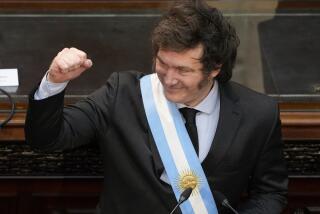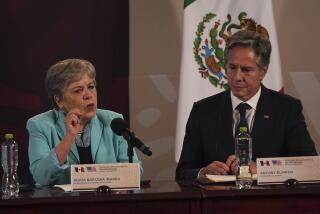Meese Backs Colombia in Drug War
- Share via
BOGOTA, Colombia — Atty. Gen. Edwin Meese III, meeting Thursday with Colombian President Virgilio Barco Vargas under extremely tight security, expressed U.S. confidence in Barco’s commitment to fight cocaine traffickers, who Meese said “literally threaten the stability of the governmental institutions of this country.”
But Meese was unable to obtain a pledge from Barco to restore the U.S.-Colombian extradition treaty, which drug kingpins here regard as a major threat. The Colombian government “is very much interested in pursuing (extradition) as a vehicle” against the drug traffickers but faces judicial and legal problems in re-establishing the pact, Meese said.
Nevertheless, Meese said he had “very excellent discussions” in his 2 1/2-hour meeting with Barco and other Colombian cabinet and military officials involved in the anti-drug effort. The attorney general said that he and Barco are in total agreement over the need to combat the drug lords of Colombia, who have assassinated several judges as well as the nation’s attorney general, Carlos Mauro Hoyos.
Discussed Multinational Force
Meese, heading a weeklong presidential mission on the cocaine crisis in Colombia and four other Latin American countries, said he and Barco also discussed the increased use of highly sophisticated automatic weapons by drug traffickers and a U.S. proposal to develop a multinational police force to combat the cocaine trade.
In response to questions by reporters, Meese said the controversial idea of a multinational force being employed against drug traffickers was discussed as a “long-range concept.” Barco said he regards the idea, disclosed Wednesday, as an “interesting concept” but noted that it would require the signing of treaties that probably would be difficult to accomplish, Meese added.
The attorney general is the highest U.S. official to visit violence-scarred Bogota since June, 1986, when Vice President George Bush attended Barco’s inauguration. Extraordinary security measures were taken for Meese’s visit to Colombia, home to the notorious Medellin drug cartel.
Tight Security
At the military airport in Bogota, more than 30 Colombian soldiers and a contingent of FBI agents with automatic weapons ringed the area, where Meese, Drug Enforcement Administration head John C. Lawn and other U.S. officials arrived Thursday. The security was even tighter around the U.S. Embassy, which suffered minor damage last month from a rocket attack, and at the president’s national palace, where Meese and Barco met.
At least 80% of the cocaine now entering the United States is produced in or transported through Colombia, according to U.S. estimates. One of the most important potential weapons in the cocaine fight is an extradition treaty, which Colombia’s Supreme Court struck down last year, then blocked efforts by Barco to restore it.
The extradition issue became even more critical in December, when a Colombia magistrate freed Jorge Luis Ochoa, a key member of the Medellin cartel, the major force behind the cocaine trade here. A U.S. Embassy official expressed optimism in noting last week’s attempt by a Colombian military unit to apprehend Pablo Escobar, reputed to be a founder of the cartel.
Narrowly Escaped Capture
But another U.S. official, acknowledging the vast influence and fear of the cartel, said: “I don’t know what they would have done if they got him.” Escobar, who narrowly escaped capture, is wanted on drug charges in Colombia and the United States.
At an airport news conference before leaving for Ecuador, Meese said no specific proposals for restoring extradition were discussed, “other than we want to continue working on the problem.”
Another major component in the anti-cocaine drive is the proposed multinational police force. But one embassy source, noting that U.S. officials had expected a “prickly” reaction by Colombians to this proposal, said: “The truth of the matter is that no one is thinking of U.S. troops here.”
More to Read
Sign up for Essential California
The most important California stories and recommendations in your inbox every morning.
You may occasionally receive promotional content from the Los Angeles Times.










